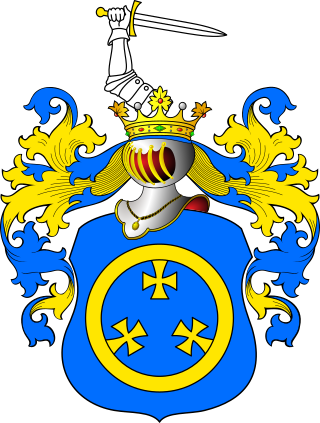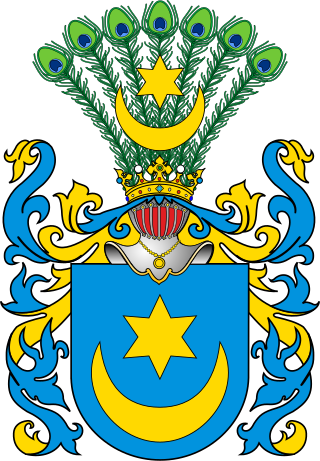See also
- Bydgoszcz Ignacy Jan Paderewski Airport (IATA: BZG, ICAO: EPBY), a Polish regional airport in the city of Bydgoszcz, Poland
Ignacy is a Polish given name. This is the Polish equivalent of the name Ignatius . Notable people with the name include:

Radzyń Podlaskipronounced[ˈrad͡zɨɲpɔdˈlaskʲi] is a town in eastern Poland, about 60 km north of Lublin, with 15,808 inhabitants (2017). The town has been part of the Lublin Voivodeship since 1999, previously it was part of the Biała Podlaska Voivodeship (1975–1998). It is the capital of Radzyń Podlaski County, and historically belongs to the region of Lesser Poland. The town was founded in 1468, and its most important landmark is the rococo Potocki Palace.

Ignacy Wyssogota Zakrzewski (1745–1802) was a notable Polish nobleman, politician, art collector, Freemason, and the Mayor of Warsaw during the last years of the Polish–Lithuanian Commonwealth, in 1792 and 1794.
Władysław is a Polish given male name, cognate with Vladislav. The feminine form is Władysława, archaic forms are Włodzisław (male) and Włodzisława (female), and Wladislaw is a variation. These names may refer to:
The ideas of the Age of Enlightenment in Poland were developed later than in Western Europe, as the Polish bourgeoisie was weaker, and szlachta (nobility) culture (Sarmatism) together with the Polish–Lithuanian Commonwealth political system were in deep crisis. The period of Polish Enlightenment began in the 1730s–40s, peaked in the reign of Poland's king, Stanisław August Poniatowski, went into decline with the Third Partition of Poland (1795) – a national tragedy inspiring a short period of sentimental writing – and ended in 1822, replaced by Romanticism.

Prince Antoni Stanisław Czetwertyński-Światopełk (1748–1794) was a nobleman (szlachcic) and politician in the Polish–Lithuanian Commonwealth.
Marcin Knackfus, was an architect, professor, and military captain from the Polish–Lithuanian Commonwealth.

The Konarski Secondary School is a coeducational public secondary school in Rzeszów, Poland. Founded in 1658, it is one of the oldest secondary schools in Poland. Located in the old town in a historic building designed by Tylman van Gameren, it plays an important role in the cultural life of Rzeszów and Subcarpathia Province.
Konstanty is a Polish-language given name and a surname, a variant of Constantine. Notable people with the name include:

The Ledóchowski family is a Ruthenian, Polish and Austrian noble family of Ruthenian origin from Volhynia. Members of the family have over the centuries distinguished themselves through services to the Catholic Church, the Austrian Crown as well as the Polish Crown.
Franciszek is a masculine given name of Polish origin. It is a cognate of Francis, Francisco, François, and Franz. People with the name include:

Helena Maria Paderewska was a Polish social activist who helped found the Polish White Cross society during World War I, and also is known as the second wife and partial biographer of Polish patriot, prime minister and musician Ignacy Jan Paderewski.

Clan Ostoja (Moscics) is one of the largest and oldest knightly and heraldic families in Europe, belonging to the Polish nobility. The family is sealed with the Ostoja coat of arms.
Jakób Gieysztor was a Polish-Lithuanian nobleman and politician who participated in the January Uprising of 1863. Gieysztor was also an antiquarian, publicist, and one of the leaders of the Whites political group in Lithuania. He has published his memoirs of his participation in the uprising and the subsequent deportation to Siberia.

Józef Napoleon Hutten-Czapski (1797-1852), from the Polish noble Leliwa family, was an insurgent during the November Uprising and an independence activist. He was the father of Bogdan Hutten-Czapski.